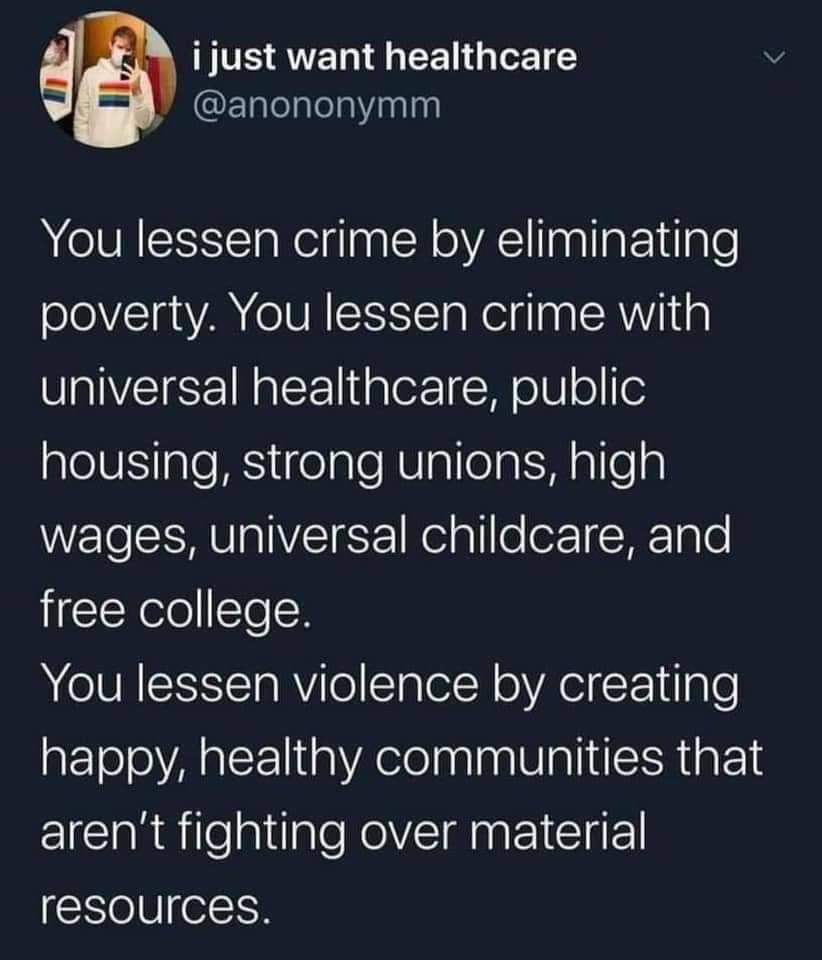re: Conflict theory, first developed by Karl Marx,
OP:

#ConflictTheory
What Is Conflict Theory? Conflict theory, first developed by Karl Marx, is a theory that society is in a state of perpetual conflict because of competition for limited resources. Conflict theory holds that social order is maintained by domination and power rather than by consensus and conformity.
my response:
Okay so I looked at this post and thought the claim that Marx developed "conflict theory" looked really suspicious, so I looked it up. The quote in this post is from the allegedly fact-checked Investopedia, but as a website "with the mission of simplifying financial decisions and information to give readers the confidence to manage every aspect of their financial life," I feel that this kind of simplification of information is really a bourgeois co-optation of communist theory.
Conflict theory is a sociological theory derived from Marx, as clarified by LibreText here. The founding of modern conflict theory is not attributed to Marx, but C. Wright Mills, who "believes social structures are created because of conflict between differing interests"--an ahistorically-grounded idealist view that's been abstracted from the problem of material classes historically developed by capitalism that Marx was writing about.
There's actually an academic article published in a social science journal written by Manorama Savur that explicitly critiques the conflict theory as a theory designed to serve the interests of the capital-owning class of the bourgeois. She writes (emphases mine):
"The major function of modern conflict theory is to defend capitalism equally in its incipient forward-looking phase as in its later parasitic decadence. A note of realism becomes evident in observing the presence of conflicting interests in society. Not a conflict theorist himself, Marx has no use for such concepts as 'conflict of interests'. He pointed out the positive historical role of capitalism and its contributions analyzing at the same time the contradictions that develop within the system. Further development of new productive forces (new in contrast to the feudal), essentially a concomitant of capitalism is hampered by the existing capitalist production relations. These relations are consciously and violently violated by the productive forces in a bid for release to facilitate higher development. The contradiction takes the form of class conflict. A successful class conflict results in a radically different social structure. Secondly, the content of the term 'conflict' as used by Marx is basically different from the term used by all conflict theoreticians. For instance, the basic thesis of the contemporary conflict theorist is: 'Resolution of conflict of interest leads to a higher phase of equilibrium within the capitalist system.' The words used by Marx is 'to burst asunder', unlike the conflict theorists' desire for 'resolution of conflict of interest'. Thirdly, an important point of difference with Marx is the insistence of most theorists of the conflicting tendency as an essential part of an unchanging, eternal human nature. Marx sees conflict essentially as a product of society rather than as a causative factor of change."
The rest of Savur's article goes into the bourgeois history of conflict theory's development, including its ties to classical liberal theories about social contract, the bourgeois French revolution and their understanding of social conflict in terms of their interests, and the understanding of conflict as competition for limited resources as a framework tied to pro-capitalist theories of the free market. The most damning critique comes at the very end in the section on British sociologist John Rex's use of conflict theory to analyze decolonization, where in a "blatant misrepresentation of Marxism" he argues for overcoming conflicts of interest under decolonization by colonizers exploiting racism and other stratifications to consolidate power over former colonies.
TL;DR Conflict theory is radlib and counterrevolutionary against a proletarian revolution.